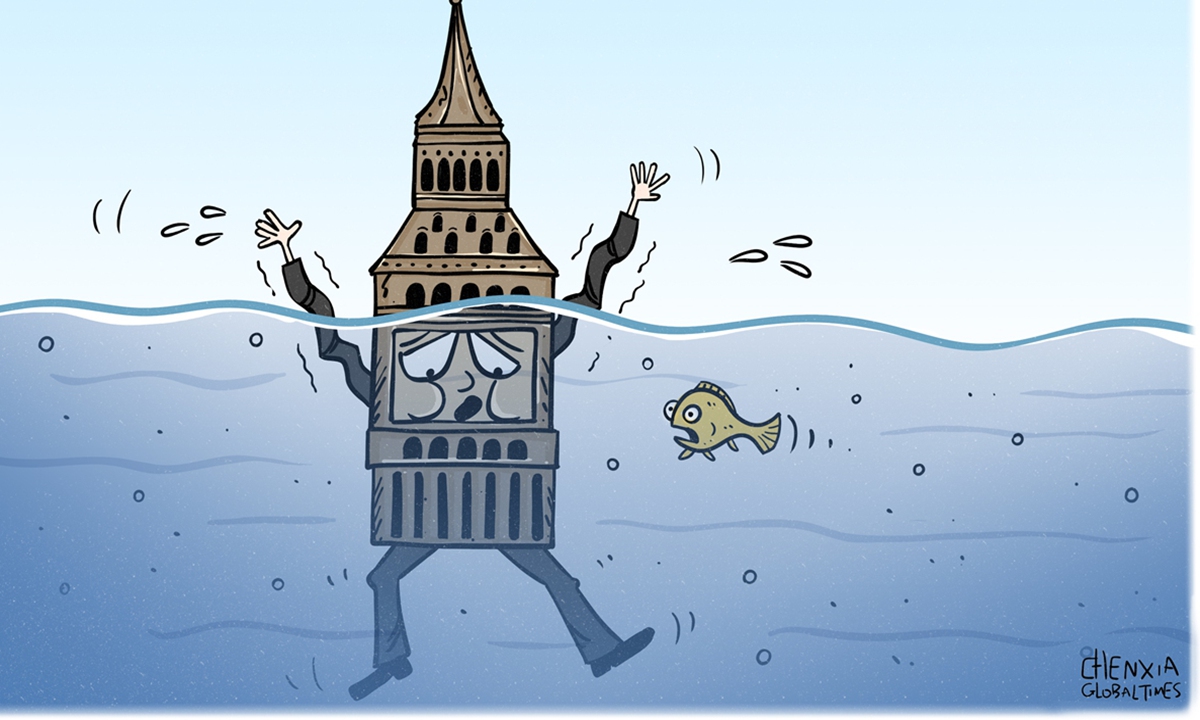Hyping ‘China threat,’ UK politicians as sensational and low-class as the country’s tabloids

UK Illustration: Chen Xia/GT
British drama queens are on the move again. When Richard Moore, chief of MI6, the UK's secret intelligence service, said that China is a bigger threat than terrorism, he showed nothing but sensationalism and unprofessionalism.
Addressing the Aspen Security Forum in Colorado on Thursday local time, Moore articulated that China was now the top intelligence priority for MI6, surpassing counter-terrorism. One of the excuses he gave is that China is watching the Ukraine crisis closely for lessons about how to achieve its goal in the Taiwan question.
Moore's rhetoric reminds people of British Foreign Secretary Liz Truss, who laid bare her laughable ignorance of history and geography during a meeting with Russian Foreign Minister Sergey Lavrov, Shen Yi, a professor at the School of International Relations and Public Affairs of Fudan University, told the Global Times. When Moore put strategic competition and anti-terrorism together, he also makes professional analysts feel a sense of embarrassment.
If MI6 were more professional, it wouldn't make a fuss about groundless speculation. If more British politicians were more professional, they would be sober-minded about the fact that the biggest threat to the UK is its own development - and governance-related puzzles. Voices have been loud in Scotland and Northern Ireland to leave the UK for quite some time. If those issues are not fixed, social turmoil could emerge.
Unfortunately, some British politicians have delivered little professionalism on domestic challenges, but displayed great enthusiasm and skilled tactics in clamoring about geopolitics, or more specifically, playing the China card, like how British tabloid newspapers attract eyeballs.
The race to replace Boris Johnson as the UK's next prime minister has come to the final stage, as lawmakers from the Conservative Party have selected the final two candidates, former finance minister Rishi Sunak and Truss. The two front-runners represent the two forces within UK political circles - the relatively pragmatic side which advocates cooperation with China, and the typical hawkish side which views China as a rival and threat, Cui Hongjian, director of the Department of European Studies at the China Institute of International Studies, told the Global Times.
As the debates go on, Moore may have raised his voice to impose influence on the country's next leader and administration. Similar hype has become increasingly frequent lately in the UK. Two days before Moore's speech, Ben Key, in his first public address as British First Sea Lord, said China is a more dangerous foe than Russia - of course, this is a convenient excuse to seek more funding from the incoming government.
The trend is quite clear - some British politicians are eager to grab the limelight by simply showcasing their hawkish stance against China, just like how the UK itself tries hard to prove its global status in the global arena.
George Galloway, a six-term British parliamentarian, said that "when we act and express today the interference in China's internal affairs, we do so not on our own behalf, but on behalf of the American empire as the tail of the American dog." Be it its participation in the AUKUS and Indo-Pacific Strategy, blatant finger-pointing on Hong Kong and Taiwan affairs, or more Anglo-Saxon alliance against China, the UK has shown it is ready to play its part on the command of the US.
This is because the UK has never reconciled itself to its loss of empire and its decline in the world. To some extent, London has tied its yearning to regain its past glory to the US hegemon.
In the Russia-Ukraine conflict, the UK has been charging to the forefront via high-profile support to Ukraine, including offering intelligence and weapons. Obviously, that is not enough for some British politicians, who have found a new mission - fanning the flames in Asia by stirring up trouble on the Taiwan question. This is not supposed to be the real content of "Global Britain," is it?
"The UK won't go far by riding on the US' chariot, because the latter will fall from hegemony eventually," said Song Zhongping, a Chinese military expert and TV commentator.
If the UK wants to make a difference, it needs different politics and different politicians, who are serious about taking care of the country and its people's interests, rather than picking fights out of nowhere to grab attention, just like boring, low-class British tabloids.


